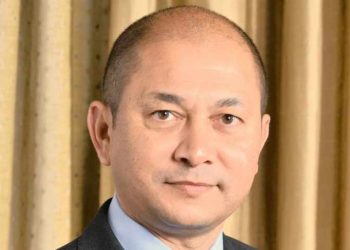Durban – THE MSUNDUZI Municipality has admitted it had spent less on infrastructure maintenance, which has led to the decay of the Pietermaritzburg central business district (CBD), driving South African-owned businesses out of the city.
This as business owners and ratepayers raised concerns about the state the city is in and placed the blame on the Msunduzi Municipality council for neglecting its oversight role.
DA councillor Bill Lambert, who once ran a clothing shop in the CBD, said this was an embodiment of the City’s service delivery collapse.
He said things were fine under the first post-democracy mayor, Omar Latif, as well as his predecessors Siphiwe Gwala and Hloni Zondi, but the rot started under Zanele Hlatshwayo, who was sacked following allegations of gross mismanagement, maladministration and corruption.
Once a thriving business hub between the dawn of democracy and early 2000s, the Pietermaritzburg city centre finds itself in a situation that has pushed established businesses out of its CBD to be replaced largely by informal foreign-owned businesses.
Lambert said he would never go back to the area to do business. “It is a collapsed city.”
He said despite the answers to the problem being known, “nothing gets done about it. Zweli Mkhize (health minister), Blade Nzimande (higher education minister) and other Cabinet members came here, and all said this is a filthy dirty city.”
The Msunduzi Association of Residents and Ratepayers (MARRC) and the Msunduzi Economic Development Association (Meda) were “gatvol” about the state of the city.

The Msunduzi Municipality is the littered city Pietermaritzburg with refuse not collected from the CBD. Picture: Motshwari Mofokeng /African News Agency (ANA)
While it had been reported the City had in the 2020/21 financial year collected revenue of R5.9 billion and spent R5.1bn, pavements and pothole-riddled streets are littered with uncollected refuse.
The ANC in the province recalled former mayor Themba Njilo two years ago and replaced him with Mzimkhulu Thebolla in an effort to remedy the situation.
However, nothing visible has improved under Thebolla’s administration. Thebolla, in January, told Independent Media’s investigations unit the financially constrained council required R10bn to revitalise the City’s service delivery infrastructure.
During an official visit to his home city in 2019, Mkhize, who was then Cooperative Governance and Traditional Affairs (Cogta) minister said: “It brings shame to us who come from the area (city) when our Cabinet colleagues … (after) having passed-through Pietermaritzburg, highlight how dirty the city is.”
Meda chairperson Kantha Naidoo said shops would flood whenever it rained as drainages were blocked by uncollected garbage as a result of lack of maintenance and by-laws enforcement.
“If you speak to business owners, there is no investor confidence. They don’t want to put their money in Pietermaritzburg because there is nothing here for them,” said Naidoo.
Naidoo, who is also the treasurer of the CBD’s Loop Street Police Station community police forum and chairperson of the Pietermaritzburg Chamber of Business’s crime-fighting forum, said she had on numerous occasions witnessed drugs being sold openly, and when this was reported to the police nothing tangible came out of it. “South African-owned businesses have moved to malls or safer areas.”
MARRC chairperson Anthony Waldhausen said the situation was caused by dysfunctionality at the mayor’s office down to the lower level City management.
The municipality was placed under administration two years ago with former eThekwini municipal manager Sbu Sithole appointed as the administrator after it was uncovered most councillors were under-performing and the municipality was overwhelmed with irregular expenditure and maladministration.
Sithole has since been replaced by Cogta chief director for municipal government and administration Scelo Duma, who declined to respond to questions. Premier Sihle Zikalala’s office also declined to comment.
Municipal manager Madoda Khathi told the provincial Cogta portfolio committee on January 27 his office was taking full responsibility for Pietermaritzburg being regarded as the filthy city.
He said the City had, in the past, used old garbage collection trucks that frequently required repairs. “As a result, in July, council made an allocation for five trucks to be procured.”
Khathi said the municipality’s landfill site, which had reached its lifespan, was occupied by armed illegal immigrants that made it dangerous for workers. The process of acquiring the new landfill site has taken more than 20 years. “So we have to start … from scratch in terms of identifying the (new) landfill site.”
Thebolla told the committee he was leading awareness campaigns to galvanise the community to participate in turning the city’s image around.
“In order for us to be able to deal with waste on a daily basis, we need at least 17 running trucks. For this financial year, we have procured five (trucks) in addition to the fleet that we have. At least if we can have 11 (trucks) running on a daily basis, we will be able to meet our targets,” Thebolla said.
ANC provincial spokesperson Nhlakanipho Ntombela admitted under Thebolla the city was on a slippery slope. “It is true that things are not right. We have called on the provincial government to intervene.”
KwaZulu-Natal (KZN) Standing Committee on Public Accounts (Scopa) chairperson Maggie Govender warned Thebolla and City management to focus on revenue collection. “We want proper management in this municipality.”
Cogta committee chairperson Zinhle Cele also called on the council to hold “people accountable”.
bongani.hans@inl.co.za
| Investigations Unit


















